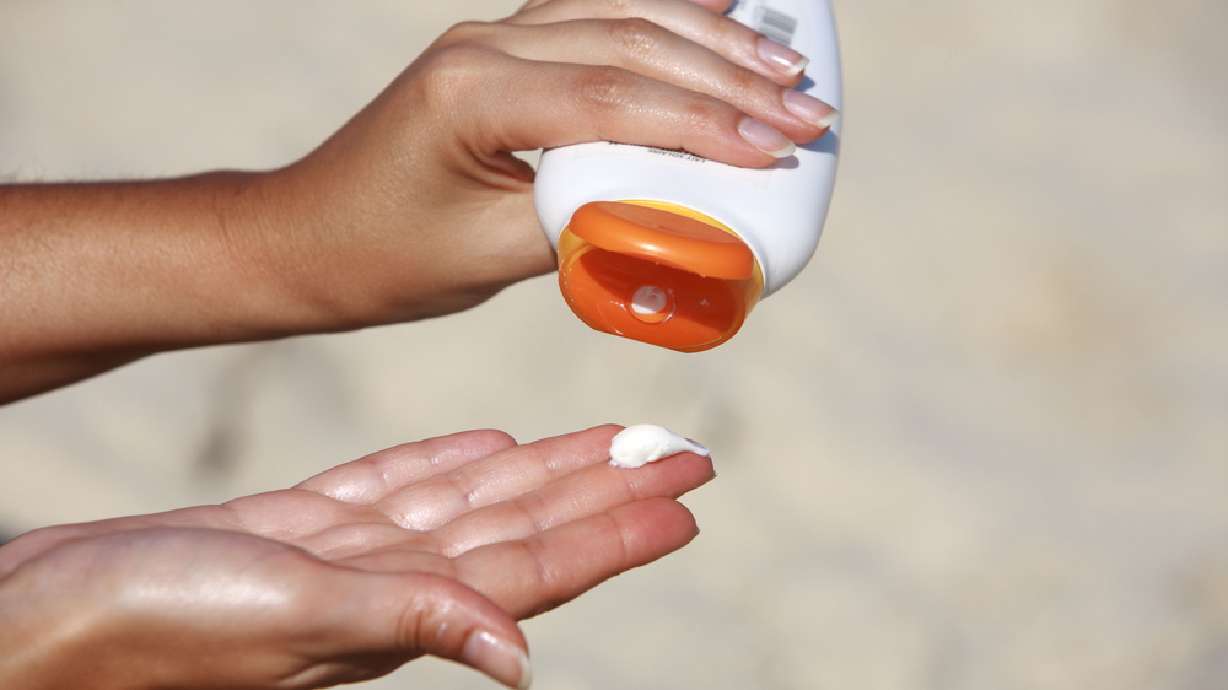Estimated read time: 4-5 minutes
This archived news story is available only for your personal, non-commercial use. Information in the story may be outdated or superseded by additional information. Reading or replaying the story in its archived form does not constitute a republication of the story.
SALT LAKE CITY — Memorial Day kicked off the beginning of pool season, and most people will now be spending a lot of time outside.
Added time in the sun means added risk of getting a sunburn, especially at the beginning of summer when some of us have spent the majority of winter inside. A lot of sunscreens on the market don't cover everything they're supposed to.
What kind of sunscreen should you look for?
Dr. Tawnya Bowles, a surgical oncologist at Intermountain Medical Center, says there are three things to look for when you're going to buy sunscreen.
"What I tell my patients is has to have an SPF of 30 or higher, broad spectrum, and be water resistant." Dr. Tawnya Bowles
"What I tell my patients is (it) has to have an SPF of 30 or higher, broad spectrum and be water-resistant," Bowles said.
What does broad spectrum mean? Bowles says it means the sunscreen covers both UVA and UVB sun rays. And while most sunscreens protect against UVB rays, there has been recent increasing evidence that UVA rays also cause skin cancer.
5 best protective sunscreens for your money
Consumer Reports and the Environmental Working Group both put out lists of the best sunscreens to use that are the safest and most effective. There are almost 200 recommended sunscreens on the list, but many are pricey and only available online. Plus, high price doesn't always mean high protection.
If you're looking for convenience and a low price, here are some good options. They all include an SPF of 30 or higher, are broad spectrum and water-resistant, and can be picked up at virtually any store.
1. Coppertone Water Babies Pure & Simple Sunscreen Lotion, Broad spectrum, Water resistant, SPF 50: $10.99 for 8 oz.
#poll
2. CVS Baby Sun Lotion Sunscreen, Broad Spectrum, Water resistant, SPF 50: $9.99 for 8 oz. 3. Target's Up and Up Sport Sunscreen, Broad Spectrum, Water resistant, SPF 30, $7.99 for 10.4 oz.
4. Equate Brand Sport Lotion, Broad Spectrum, Water resistant, SPF 50: $7.50 for 16 oz.
5. Aveeno Baby Natural Protection Face Stick, SPF 50: $10.99 for 0.5 oz stick.
Make sure you reapply every two hours, or if you're in the water or sweating, every 40-80 minutes.
5 worst sunscreens to use
1. Continuous spray sunscreens: While spray sunscreens might seem like your easiest option, EWG recommends against using them because of the potential to inhale the chemicals. It's also hard to make sure you hit every exposed part of your skin. Stick to lotion sunscreens that you rub in.
There is conflicting information, however. Consumer Reports recommends Up & Up's Continuous Spray SPF 30 sunscreen as one of the best sunscreens for your money.
2. Tanning oil sunscreens: Most tanning oils contain a little SPF, but not enough to protect you. For example, Banana Boat's Deep Tanning Oil has an SPF of only 4. Stay away from the oils, as they increase your risk of burning and promote risky sun behavior.
3. Super high SPF sunscreens: Bowles says anything higher than SPF of 30 does little to protect your skin. Don't be fooled by sunscreens with SPF 100.
"There is no sunscreen that can block all of the sun," Dr. Bowles said. "SPF 30 blocks 97 percent of the rays. If you use a higher SPF, you get a little protection, but it is not as significant as it sounds."
4. Sunscreen wipes: The FDA banned sunscreen wipes and towelettes in 2011, but some companies are allowed to sell them for one more year to get rid of their products. Most people who use the product don't get enough sunscreen on their skin to do any good.
5. Combination bug repellant/sunscreens: Bugs are not really a problem during peak sun hours. Limit your risk of exposure to chemicals by just sticking with sunscreen.
- SPF of 30 or higher
- Labeled "Broad spectrum" to protect against UVA and UVB rays
- Be water-resistant, epsecially if you'll be sweating or in the pool
What else can you do to protect your skin?Bowles says there are many other things you can do to avoid a sunburn this summer.
To help your kids reduce the chance of sunburn, get them a swim shirt for the pool.
"Swim shirts are really good for little kids because it covers up a big part of the body," Bowles said. "I would encourage parents to get in the habit of getting their kids to wear swim shirts."
You can also reduce skin damage by avoiding the sun during the hottest time. A lot of us will spend time at the pool or water park, though, so it's not always realistic to avoid the sun from 10 a.m. to 4 p.m. every day. Bowles says to make sure you cover up the skin and other parts of the body as much as possible.
"That includes wearing a hat, covering the arms and legs," Bowles said. "The more protection you have, the more effective all these methods are against skin cancer."
She says to also keep an eye on your skin for any changing spots and to have a skin check at least once a year by your doctor.
Sunscreen isn't only for summer time. What's the most important thing you can do for your skin?
"We encourage people to get in the habit of putting sunscreen on every day," Bowles said. "Even in the winter here, we get exposure. Get in the habit and it will become second nature."








